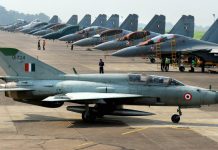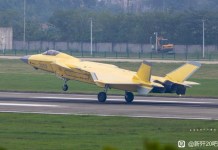India and Japan which are part of the QUAD block seem to have joined hands in the Indian Ocean region. India’s strategically-located Andaman & Nicobar islands could soon serve as eyes and ears of the Indian military and security agencies in keeping a tab on Chinese naval activity in the region.
Japan, which along with India is part of the QUAD bloc, has offered assistance to develop civilian and military infrastructure in the island chains.
The Andaman and Nicobar islands are located at the western entrance to the Malacca Strait, Southeast Asia’s main shipping lane. They serve as an important military base from the Indian Ocean up to the Pacific. China continues to deploy its naval assets to intimidate the littoral states in the region.
“It [the Andaman] is also close to the Straits of Indonesia, the alternate route into the Indian Ocean, especially for submarines,” writes Darshana Baruah of Carnegie Endowment for International Peace.
President Shri #RamNathKovind witnessed Joint Services Operational Demonstration by Andaman & Nicobar Command highlighting multi-dimensional operational capabilities including #amphibious landing of troops by Landing Ship Tank & Landing Craft Utility (1/2) https://t.co/wQHIDBF8O2 pic.twitter.com/oTSldNCdru
— SpokespersonNavy (@indiannavy) February 28, 2021
Submarines are generally more difficult to detect but the narrowness of the Malacca Strait ensures the surfacing of these stealthy vessels. The Andaman and Nicobar islands’ location next to these straits provides the Indian Navy with a scope to monitor Chinese submarines.
“The eastern Indian Ocean is likely to be of particular interest to the Chinese Navy as they expand their submarine capabilities. The data from these surveys may help submarines navigate, or improve their chances of remaining undetected,” according to H.I. Sutton, defense and open-source intelligence analyst
The “string of pearls” theory highlighted by Indian policymakers about a decade ago suggests that China is trying to encircle India and threaten its security with its projects surrounding the Indian mainland. With a military base in Djibouti and maybe in Gwadar, Chinese presence in the Indian Ocean is set to increase rapidly in the coming years.
The perception of the Chinese threat has also thus been steadily rising. In recent years, India has begun building coastal radar networks and ports in collaboration with other South Asian countries. Last year, there were reports of India setting up a “sound surveillance sensors chain” in the Andaman sea with the help of the US and Japan.
The network is aimed at creating a counter-wall against Chinese submarines loitering in the Andaman sea and deep South China sea, according to the reports.
#WATCH | Indian Navy Marine Commandos conducted combat free-fall exercises at all airfields of Andaman and Nicobar Islands on November 17 and November 18.
(Video source – Indian Navy) pic.twitter.com/TfVSznV3A7
— ANI (@ANI) November 20, 2020
The Andaman and Nicobar Command (ANC) is India’s first and only tri-services command with integrated land, sea, and air divisions under one commander. The Ladakh standoff with China last year motivated India to speed up its militarization process of the island chain with additional warships, aircraft, missile batteries, and soldiers.
Japan and India share the mutual threat of an aggressively expanding China. Both are not only members of the QUAD, an informal security association group, but also have deep bilateral ties as part of India’s Look East policy. Last month, Japan extended support in the first-ever official development assistance (ODA) project in the archipelago of 524 islands after a pledge between both countries for a free and open Indo-Pacific.
The $36 million Project for Improvement of Power Supply in Andaman and Nicobar Islands is part of New Delhi’s Indo-Pacific collaboration with Tokyo, The Economic Times reported.
“Due to its geopolitical location, Andaman & Nicobar Islands play a crucial role in our shared vision for a free, open, and inclusive Indo-Pacific. Cooperation between Japan and India on these crucial islands demonstrates the commitment of both countries to realizing a stable, peaceful, and prosperous Indo-Pacific,” the daily quoted an official as saying.
Follow EurAsian Times on Google News




